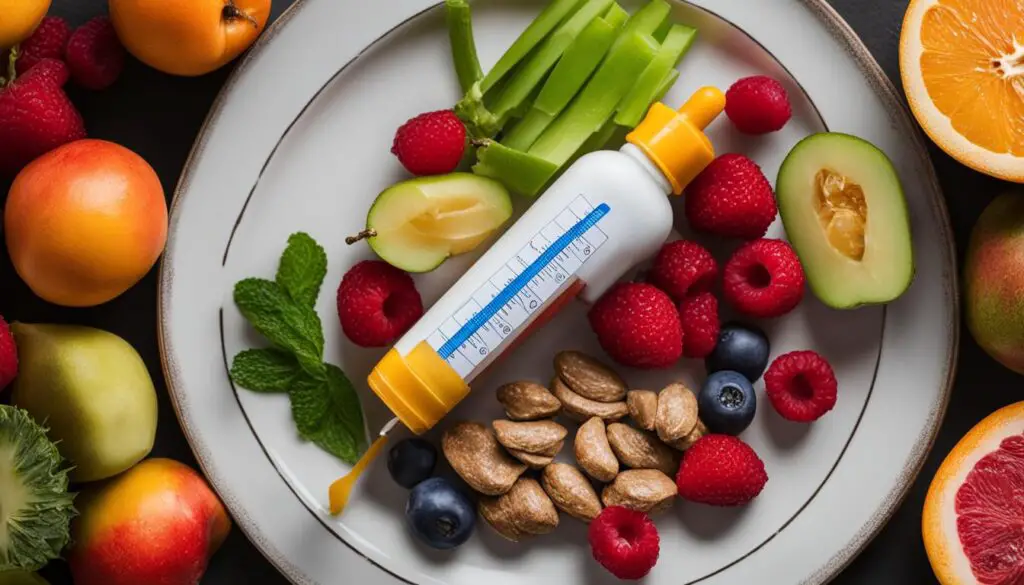Did you know that the HCG diet, a controversial weight loss method, advocates for severe calorie restriction of only 500 to 800 calories per day? This extremely low-calorie intake is accompanied by the use of the hormone human chorionic gonadotropin (HCG), which is believed to aid in weight loss.
The HCG diet has gained popularity, but it’s important to note that the FDA does not approve of HCG as a weight loss aid and advises against using over-the-counter HCG products. The safety and effectiveness of the HCG diet have been questioned, with some studies suggesting a possible increase in cancer risk. Severe calorie restriction diets like the HCG diet can also lead to various health risks, including gallstone formation, irregular heartbeat, nutrient deficiencies, and electrolyte imbalances.
While the HCG diet may promise quick weight loss, there are safer and more sustainable ways to achieve your weight loss goals. It’s crucial to prioritize your health and consult with a healthcare professional before embarking on any weight loss program.
Key Takeaways:
- The HCG diet advocates for severe calorie restriction, typically around 500 to 800 calories per day.
- The FDA does not approve of HCG as a weight loss aid and advises against using over-the-counter HCG products.
- Severe calorie restriction diets like the HCG diet can lead to various health risks and may increase the risk of cancer.
- There are safer and more sustainable ways to achieve weight loss, such as following a balanced diet and engaging in regular exercise.
- Consult with a healthcare professional before starting any weight loss program.
The Controversy Surrounding HCG Diet
The HCG diet has attracted controversy due to its use of a hormone, HCG, that is primarily used to treat fertility issues and not approved for over-the-counter weight loss. The FDA has warned against using over-the-counter HCG products and states that companies selling these products are breaking the law.
There is no scientific evidence supporting the effectiveness of HCG for weight loss, and severe calorie restriction is likely the primary reason for weight loss on this diet. Some studies have also linked HCG weight-loss products to a potential increase in cancer risk.
It is important to consult with a healthcare provider before starting any weight loss program, especially one that involves severe calorie restriction and the use of unapproved substances.
The FDA’s Stand on HCG for Weight Loss
“Companies selling over-the-counter HCG weight-loss products are breaking the law. FDA strongly advises against using these products.”
The controversy surrounding the HCG diet stems from its utilization of a hormone known as HCG, which is typically used for treating fertility issues and not approved for weight loss purposes by the FDA. The FDA has clearly stated that over-the-counter HCG products are illegal and should not be used for weight loss.
No Scientific Evidence Supporting HCG for Weight Loss
“Extensive research has shown that there is no scientific evidence supporting the effectiveness of HCG for weight loss.”
Multiple studies have debunked the notion that HCG directly contributes to weight loss. The primary reason for weight loss on the HCG diet is the severe calorie restriction it imposes. Therefore, it is crucial to approach any weight loss program, especially those involving extreme calorie restriction and unapproved substances, with caution and medical guidance.
Potential Cancer Risk
“Studies have suggested a possible increase in cancer risk associated with HCG weight-loss products.”
Some studies have indicated a potential link between HCG weight-loss products and an increased risk of cancer. It is vital to consider the potential health risks and consult with a healthcare provider before embarking on any weight loss program.
While the HCG diet has gained popularity, it is important to prioritize health and safety when considering weight loss methods. There are safer and more evidence-based approaches to weight loss, such as following a balanced diet and engaging in regular exercise.
HCG Diet Guidelines and Restrictions

The HCG diet requires strict adherence to specific dietary guidelines and restrictions. During the weight loss phase, which typically lasts 3 to 6 weeks, individuals are limited to consuming only 500 calories per day. This low-calorie diet aims to promote rapid weight loss.
Here are the key guidelines and restrictions to follow while on the HCG diet:
- Meal Frequency: Limit your meals to two per day, usually lunch and dinner. Avoid snacking between meals.
- Calorie Intake: Consume a maximum of 500 calories per day.
- Lean Protein: Include one portion of lean protein in each meal. Approved protein sources include chicken breast and white fish. Avoid high-fat proteins like beef or pork.
- Vegetable Intake: Include a serving of vegetables in each meal. Approved vegetables for the HCG diet include spinach, tomatoes, cucumbers, and cabbage.
- Bread Option: Incorporate a bread option, such as a breadstick or melba toast, with each meal.
- Fruit Serving: Include a serving of fruit with one of your meals. Choose from options like apples, oranges, or strawberries.
- Avoid High-Fat Foods: Eliminate foods high in fat, such as oils, butter, and fatty cuts of meat.
- Avoid Certain Fish: Exclude fish varieties like salmon and tuna from your diet.
- Visible Fat: Trim any visible fat from meats before cooking.
- No Added Sugar: Sugar is not allowed on the HCG diet. Avoid adding sugar to your meals or beverages.
- Sweeteners: Limited use of zero-calorie sweeteners is permitted.
- Liquid Consumption: Drink plenty of water throughout the day. Coffee and tea are also allowed. However, restrict milk intake to 1 tablespoon per day.
Following these guidelines is crucial to ensure the effectiveness of the HCG diet and maximize weight loss results. It is important to note that the HCG diet is a highly restrictive eating plan and should only be undertaken under the guidance and supervision of a healthcare professional.
Safety and Side Effects of the HCG Diet
The HCG diet, with its severe calorie restriction, carries potential safety risks and side effects. By limiting calorie intake to only 500 calories per day, individuals may experience various health concerns.
Side Effects of the HCG Diet
Individuals adhering to the HCG diet commonly report experiencing side effects such as:
- Fatigue: Due to the low calorie intake, individuals may feel tired and lack energy throughout the day.
- Irritability and restlessness: The extreme calorie restriction can impact mood, leading to irritability and restlessness.
- Depression: The combination of a very low-calorie diet and hormonal changes may contribute to feelings of depression in some individuals.
- Fluid buildup: The restricted intake of fluids can cause fluid retention and swelling in the body.
- Breast swelling in males: The use of HCG hormone in males can result in breast tissue swelling.
In addition to these common side effects, more serious concerns exist with the HCG diet.
Risks and Safety Concerns
There are several potential risks associated with the HCG diet:
- Nutrient deficiencies: Severe calorie restriction can lead to inadequate intake of essential nutrients, potentially causing deficiencies.
- Muscle loss: With limited calorie intake, the body may turn to breaking down muscle tissue for fuel, resulting in muscle loss.
- Metabolism slowdown: Severely restricted calorie intake can cause the body’s metabolism to slow down, making weight loss maintenance more challenging.
- Blood clots: There is a potential risk of blood clots forming and blocking blood vessels when following the HCG diet.
- Unknown ingredients in over-the-counter HCG products: The FDA has raised concerns about the safety of over-the-counter HCG products, as they are not approved for weight loss and may contain undisclosed ingredients.
To ensure your health and safety, it is vital to consult with a healthcare professional before embarking on any weight loss program, especially one that involves severe calorie restriction and the use of unapproved substances.
| Side Effects | Safety Concerns |
|---|---|
| Fatigue | Nutrient deficiencies |
| Irritability and restlessness | Muscle loss |
| Depression | Metabolism slowdown |
| Fluid buildup | Blood clots |
| Breast swelling in males | Unknown ingredients in over-the-counter HCG products |
When it comes to weight loss, prioritizing health and safety is crucial. Explore alternative weight loss methods that are supported by scientific evidence and involve a balanced diet, regular exercise, and personalized approaches.
The Science Behind HCG and Weight Loss
The relationship between HCG and weight loss is a topic that lacks robust scientific evidence. Multiple studies have examined the effects of HCG injections versus placebo injections in calorie-restricted diets, and interestingly, weight loss was similar in both groups. This suggests that the weight loss achieved on the HCG diet is primarily a result of calorie restriction rather than the effects of the HCG hormone.
Contrary to popular belief, the HCG hormone did not significantly reduce hunger or impact weight loss outcomes in these studies. The evidence indicates that the strict calorie restriction associated with the HCG diet is the main driving force behind weight loss rather than the hormone itself.
Considering these findings, it is important to approach the HCG diet with caution and skepticism. While some individuals may experience weight loss while following this diet, the underlying mechanism is likely the severe calorie restriction rather than any unique or specific properties of the HCG hormone.
The Science of the HCG Diet
| HCG and Weight Loss | Calorie Restriction and Weight Loss |
|---|---|
| Multiple studies suggest that weight loss achieved on the HCG diet is primarily due to calorie restriction. | Calorie restriction is a well-established method for inducing weight loss. |
| The HCG hormone does not significantly impact hunger or weight loss outcomes. | Severe calorie restriction itself can lead to appetite suppression and weight loss. |
| The HCG hormone is not considered a key factor in the weight loss associated with the HCG diet. | Reduced calorie intake is the primary driver of weight loss. |
It is important to emphasize that the HCG diet’s efficacy and safety remain contentious, and it is advisable to consult with a healthcare professional before considering any weight loss program.
hCG Diet Mechanisms and Body Composition

The hCG diet claims to boost metabolism and promote fat loss without impacting muscle mass. However, there is no scientific evidence to support these claims.
In reality, severely restricting calorie intake, as seen in the HCG diet, can lead to decreased muscle mass and a slowed metabolism. Low-calorie diets may cause the body to conserve energy and reduce the number of calories burned, making weight loss maintenance challenging.
The hCG diet’s claims of preserving muscle mass and promoting anabolic states are not supported by scientific evidence.
| hCG Diet | Average Daily Calorie Requirements | |
|---|---|---|
| Calorie Intake | 500 calories per day | Varies based on age, sex, and activity level |
| Muscle Mass | May decrease due to severe calorie restriction | Can be maintained with regular exercise and a balanced diet |
| Metabolism | May slow down due to conservation of energy | Varies based on individual factors and activity level |
| Weight Loss Maintenance | Challenging due to reduced metabolic rate | Can be easier with sustainable lifestyle changes |
| Anabolic States | Claims of promoting anabolic states not supported by evidence | Depends on overall diet and exercise routine |
Scam Products and Safety Concerns
The market for HCG products is flooded with various forms such as oral drops, pellets, and sprays, many of which are misleadingly labeled as homeopathic. These over-the-counter (OTC) products claim to contain HCG but, in reality, do not. Genuine HCG products, administered as injections, are available only with a prescription from a healthcare provider.
The safety and efficacy of OTC HCG products raise significant concerns. These unregulated products may contain undisclosed ingredients, posing potential health risks to consumers. The FDA has expressed apprehension about the use of these products for weight loss and strongly advises against their usage.
Key Safety Concerns:
- Unregulated nature of OTC HCG products
- Undisclosed ingredients in OTC HCG products
- Potential health risks associated with unapproved products
It is vital to prioritize safety and consult a healthcare professional before considering any weight loss program or using HCG products.
| Product Type | Administration | Availability |
|---|---|---|
| Homeopathic HCG products | Oral drops, pellets, sprays | Over-the-counter (OTC) |
| Genuine HCG products | Injections | Prescription-only |
Safer and Sustainable Weight Loss Methods

When it comes to weight loss, prioritizing safety and sustainability is crucial. While the HCG diet may have gained popularity, there are safer and more evidence-based approaches available. Consulting with a healthcare professional, such as a doctor, dietitian, or nutritionist, can help you develop a personalized plan that focuses on balanced nutrition, regular exercise, and gradual weight loss.
Instead of extreme calorie restriction, small and sustainable calorie deficits are generally recommended. This approach allows for steady progress without putting your health at risk. By working with a professional, you can receive guidance tailored to your unique needs and goals.
Implementing a balanced diet is essential for long-term success. This means consuming a variety of nutrient-dense foods, including fruits, vegetables, lean proteins, and whole grains. By fueling your body with the right nutrients, you can support your overall health and well-being while achieving your weight loss goals.
In addition to a healthy diet, regular exercise is key for sustainable weight loss. Engaging in both cardiovascular exercises and strength training can help you burn calories, build lean muscle mass, and improve your overall fitness. Furthermore, regular physical activity can have positive effects on your mood, energy levels, and overall quality of life.
The Benefits of Safer and Sustainable Weight Loss Methods
Choosing safer and more sustainable weight loss methods offers several benefits:
- Reduced Health Risks: Extreme calorie restriction diets like the HCG diet can pose various health risks, including nutrient deficiencies, gallstone formation, irregular heartbeat, and electrolyte imbalances. Opting for safer methods minimizes these risks and promotes overall well-being.
- Long-Term Success: Crash diets and quick fixes may yield rapid weight loss results, but they are often difficult to maintain. Safer and more sustainable methods focus on gradual weight loss, making it easier to sustain your progress and maintain a healthy body weight in the long run.
- Improved Overall Health: Safe weight loss methods prioritize balanced nutrition and regular physical activity, which have numerous health benefits. These include reduced risk of chronic diseases, improved cardiovascular health, increased energy levels, enhanced mood, and better sleep quality.
By choosing safer and more sustainable weight loss methods, you can achieve your desired results while safeguarding your health and well-being in the process.
Conclusion
The HCG diet, with its severe calorie restriction and use of the hormone HCG, is a controversial weight loss method. However, it is important to note that this diet is not approved by the FDA and carries safety concerns. Research has shown that weight loss on the HCG diet is primarily a result of calorie restriction rather than the effects of the HCG hormone.
For those seeking safer and more sustainable weight loss methods, a balanced diet, regular exercise, and personalized approaches are recommended. Prioritizing health and consulting with a healthcare professional before embarking on any weight loss program is crucial. These methods promote overall well-being and long-term success in achieving and maintaining a healthy weight.
While the HCG diet may appeal to some individuals, it is essential to consider the potential risks and lack of scientific evidence supporting its effectiveness. The key to successful and healthy weight loss lies in adopting realistic and sustainable lifestyle changes that support long-term success.
FAQ
What is the HCG diet?
The HCG diet is a weight loss method that involves severe calorie restriction, typically around 500 to 800 calories per day, along with the use of the hormone human chorionic gonadotropin (HCG).
Is the HCG diet approved by the FDA?
No, the FDA does not approve of HCG as a weight loss aid and advises against using over-the-counter HCG products.
What are the dietary restrictions on the HCG diet?
During the weight loss phase, individuals are limited to consuming only 500 calories per day. Meals consist of two portions of lean protein, a vegetable, a bread option, and a serving of fruit. High-fat proteins, certain types of fish, butter, oils, and sugar are not allowed.
Are there any safety risks or side effects associated with the HCG diet?
Yes, severe calorie restriction can lead to various health risks, including gallstone formation, irregular heartbeat, nutrient deficiencies, and electrolyte imbalances. Common side effects include fatigue, irritability, restlessness, depression, fluid buildup, and breast swelling in males.
What does the scientific evidence say about the effectiveness of HCG for weight loss?
Multiple studies have concluded that weight loss on the HCG diet is primarily due to the severe calorie restriction and not the effects of the HCG hormone. The hormone itself does not significantly reduce hunger or impact weight loss.
Does the HCG diet preserve muscle mass and boost metabolism?
No, severely restricting calorie intake can lead to decreased muscle mass and a slowed metabolism. The claims of preserving muscle mass and promoting anabolic states on the HCG diet are not supported by scientific evidence.
Are over-the-counter HCG products safe?
The FDA has raised concerns about the safety and legality of over-the-counter HCG products, as they are not approved for weight loss and may contain unknown ingredients. Genuine HCG products are only available with a prescription.
What are the safer and sustainable ways to achieve weight loss?
Safer approaches to weight loss involve following a balanced diet, engaging in regular exercise, and working with a healthcare professional to develop a personalized plan. Small, sustainable calorie deficits are generally recommended over extreme calorie restriction.




